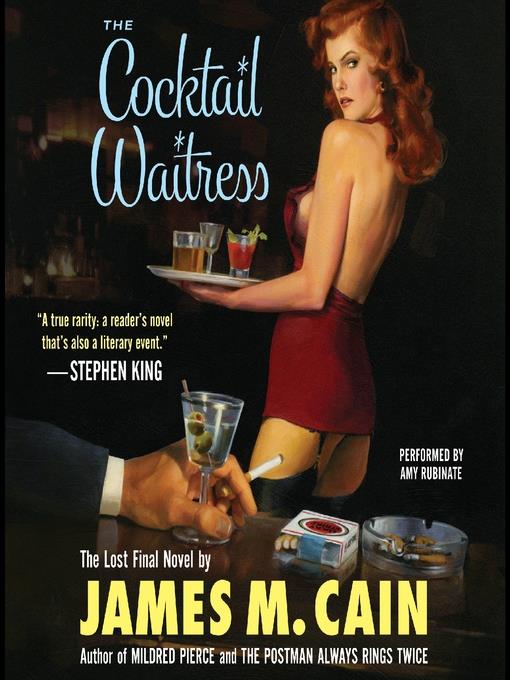
The Cocktail Waitress
کتاب های مرتبط
- اطلاعات
- نقد و بررسی
- دیدگاه کاربران
نقد و بررسی

July 9, 2012
Reviewed by Meghan Abbott. More than halfway through American noir master James M. Cain’s The Cocktail Waitress, just before its house-of-cards plot collapses under its own weight (then, in its final paragraphs, springs to life once more), the narrator tells us, “I began to realize how terrible a thing it was, the dream that you make come true.” Cain could have just as easily said those words himself. In fact, he did. “I write of the wish that comes true,” he once wrote, “for some reason a terrifying concept, at least to my imagination.” In his novels, you find neither the poetry of Raymond Chandler nor the lacerating intelligence of Dashiell Hammett, but Cain makes up for both in his keen understanding of the human heart, its darkest chambers. His best novels leave you feeling jolted and bruised. The Cocktail Waitress was Cain’s bête noire, a tale with which he wrestled during his final years. The white whale of noir scholars since the author’s death in 1977, this novel was recovered after a nine-year hunt by Hard Case Crime editor Charles Ardai, who assembled this published version from multiple versions, the same scenes rendered multiple times, none of them dated. The plot concerns a beautiful widow under suspicion by the police, a hustling young man, a sickly millionaire—all the elements of a classic Cain “love rack”—seamy tales of feverish and restless strivers caught in traps of their own making (The Postman Always Rings Twice; Double Indemnity). And like so many of his novels, it’s a confessional tale, told from the viewpoint of the widow herself, forced by economic necessity to wait tables and compelled by a mix of ambition, maternal longing, and pique to take a series of perilous risks to hit the big gold dream. What’s missing, however, is Cain’s trademark propulsive pace. The novel reads in fits and starts, perhaps the inevitable result of its bumpy lineage. Cain seems frequently bewildered by his female narrator, by how to articulate her physical desire, by how a woman might even think about her body—a potentially fatal flaw in a story about the dangerous places desire will take you. Likewise, the two male corners of the love triangle feel vague, inconsistent, and broad all at once, and the story repeatedly stutters to a halt before its final surge. Yet The Cocktail Waitress still offers much of the addictive weirdness of vintage Cain: delirious coincidences, the hidden kinks of the middle class, and a prime example of what has always been one of Cain’s greatest talents: the turn-of-the-screw moment when we realize just how trapped our narrator has become. The concluding pages offer one of the niftiest plot twists you ever saw coming—and because you are waiting for it, it hits you twice as hard. This is the essence of Cain. As with all his saps and patsies snared by their own greed and risk taking, we know the minute we meet them they are doomed. And they know it, too, but can’t stop themselves anyway. They don’t want to. (Sept.) Megan Abbott is the Edgar-winning author of six novels, including The End of Everything and her latest, Dare Me (Little, Brown/Reagan Arthur, July).

January 28, 2013
The world-weariness of the eponymous lead, Joan Medford, is perfectly captured here by narrator Amy Rubinate. As Cain’s noir opens, Medford’s just lost her husband—and under circumstances that garnered police interest. But she’s no simple widow, and Rubinate sells the rapid transformation from a grieving wife to a menacing figure determined to keep her son, in spite of efforts by her childless sister-in-law to claim him. Without histrionics, Rubinate makes Medford’s emotional but restrained threats seem true to life, and early on signals the complexity of the lead. Rubinate’s versatility serves her well in portraying the other characters; different genders, ages, and social classes are all handled perfectly. Cain devotees will find this an entertaining must-listen. A Hard Case Crime hardcover.

























دیدگاه کاربران